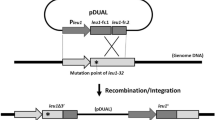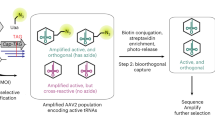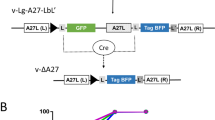Abstract
THE genetics of phage, bacteria and fungi owe much to the study of conditional lethal mutants, but little is known of the conditional lethal mutants of mammalian cells. I therefore wish to describe the isolation of conditional temperature sensitive mutants of African green monkey kidney cells (BS-C-1) (ref. 1). Because these cells are susceptible to simian virus (SV 40) yet less liable to transformation than other cell lines (hamster kidney cells, mouse embryo cells)2, I hope that this development will be valuable in the study of, first, control mechanism of virus–host interaction in cases where viral growth is inhibited at a restrictive temperature; second, regulatory mechanism of replication of cellular organelles; and third, cytological and morphological analyses in cultures synchronized by exposure (shock) to limiting conditions of temperature3.
This is a preview of subscription content, access via your institution
Access options
Subscribe to this journal
Receive 51 print issues and online access
$199.00 per year
only $3.90 per issue
Buy this article
- Purchase on Springer Link
- Instant access to full article PDF
Prices may be subject to local taxes which are calculated during checkout
Similar content being viewed by others
References
Meyer, jun., H. M., Hopps, H. E., Rogers, N. G., Brooks, B. E., Bernheim, B. C., Jones, W. P., Nisalak, A., and Douglas, R. D., J. Immunol., 88, 796 (1962).
Sabin, A., and Koch, M. A., Proc. US Nat. Acad. Sci., 49, 304 (1963).
Newton, A. A., Synchrony in Cell Division and Growth (edit. by Zeuthen, E.), 601 (Interscience, London, 1964); Rao, P. N., and Engelberg, J., Cell Synchrony (edit. by Cameron, I. L., and Padilla, G. M.), 332 (Academic Press, London, 1966).
Leibovitz, A., Amer. J. Hyg., 78, 173 (1963).
Puck, T. T., and Kao, F. T., Proc. US Nat. Acad. Sci., 58, 1227 (1967); Kao, F. T., and Puck, T. T., ibid., 60, 1275 (1968).
Loveless, A., and Howarth, S., Nature, 184, 1780 (1959); Zamenhof, P. J., Proc. US Nat. Acad. Sci., 55, 50 (1966); Adelburg, E. A., Mandel, M., and Chien Ching Chen, G., Biochem. Biophys. Res. Commun., 18, 788 (1965).
Djordjeciv, B., and Szybalski, W., J. Exp. Med., 112, 509 (1960).
Stahl, F. W., Craseman, J. M., Oknu, L., Fox, E., and Laird, C., Virology, 13, 98 (1961).
Edgar, R. S., and Lielausis, I., Genetics, 49, 649 (1964).
Westphal, H., and Dulbecco, R., Proc. US Nat. Acad. Sci., 59, 1158 (1968).
Sabin, A., and Koch, M. A., Proc. US Nat. Acad. Sci., 50, 407 (1963); Watkins, J. F., and Dulbecco, R., ibid., 58 (1967).
Author information
Authors and Affiliations
Rights and permissions
About this article
Cite this article
NAHA, P. Temperature Sensitive Conditional Mutants of Monkey Kidney Cells. Nature 223, 1380–1381 (1969). https://doi.org/10.1038/2231380a0
Received:
Revised:
Issue Date:
DOI: https://doi.org/10.1038/2231380a0
This article is cited by
-
Isolation and characterization of temperature-sensitive mutants of Chinese hamster ovary cells after treatment with UV and X-irradiation
Somatic Cell Genetics (1976)
-
Mapping of the G1 phase of a mammalian cell cycle
Nature (1975)
-
Isolation of cold-sensitive Chinese hamster cells
Molecular and General Genetics MGG (1975)
-
Temperature-sensitive Mammalian Cell Line Blocked in Mitosis
Nature (1974)
Comments
By submitting a comment you agree to abide by our Terms and Community Guidelines. If you find something abusive or that does not comply with our terms or guidelines please flag it as inappropriate.



